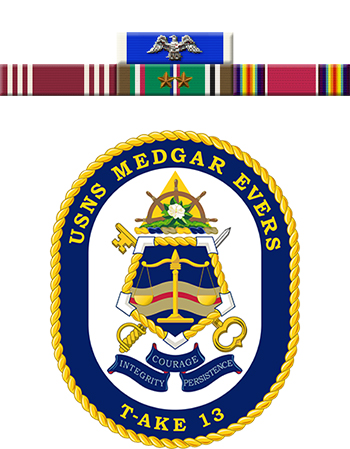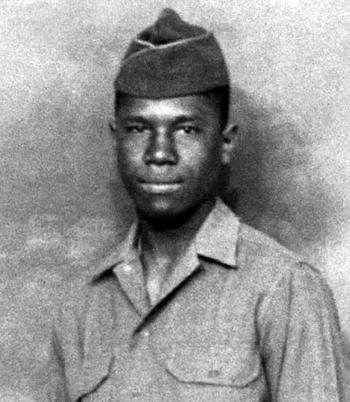
|
Medgar W. Evers |
 |
|||
| Rank, Service | ||||
Technician Fifth Grade Tech 5, U.S. Army |
||||
| Veteran of: | ||||
|
||||
| Tribute: | ||||
Medgar Evers was born on July 2, 1925, in Decatur, Mississippi. He enlisted in the U.S. Army on October 7, 1943, and went on active duty beginning on October 29, 1943. He first went to the Reception Center at Fort Benning, Georgia, from October to November 1943, and then attended basic and advanced training with the 271st Bakery Company at Fort Francis E. Warren, Wyoming, from November 1943 to March 1944. He remained at Fort Francis E. Warren for another month, and then served with the Quartermaster General Detachment, Army Services Forces Depot at Belle Mead, New Jersey, from April to May 1944. PFC Evers was assigned to the 657th Port Company at Fox Hills Cantonment on Staten Island, New York, in May 1944, and immediately deployed with his unit to England. He served as a Cargo Checker with the 657th Port Company in England from May to June 1944, and then in France from July 1944 to March 1945. His next assignment was as a Military Policeman with the 657th Port Company in France from March to May 1945, followed by service as a Military Policeman with the 325th Port Company of the 513th Port Battalion in France from May to November 1945. Tec 5 Evers served with the 3677th Quartermaster Company in France from November 1945 to February 1946, and then as a Checker with the 958th Quartermaster Service Company in France from February to March 1946. He returned to the United States in early April 1946, and was honorably discharged from the U.S. Army at Camp Shelby, Mississippi, on April 16, 1946. After leaving active duty, Evers entered Alcorn Agricultural and Mechanical College in Lorman, Mississippi, in 1948, and he graduated with a bachelor's degree in 1952. After his graduation, Evers became a Civil Rights leader in Mississippi, and was the first Field Secretary for the NAACP in the state of Mississippi. He was murdered at his home in Jackson, Mississippi, on June 12, 1963, and was buried at Arlington National Cemetery on June 19, 1963. Evers was posthumously awarded the Spingarn Medal by the NAACP in 1963, and Medgar Evers College was established in his name in Brooklyn, New York, in 1969. The airport in Jackson, Mississippi, was renamed the Jackson-Medgar Wiley Evers International Airport in his honor in December 2004, and the USNS Medgar Evers (T-AKE-13) was named in his honor in 2009, and has been in commission since 2012. He was posthumously awarded the Presidential Medal of Freedom in 2024. His murderer was not convicted until 1994. |
||||
|
||||

